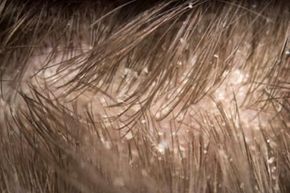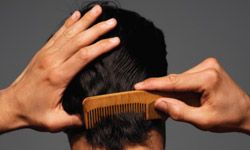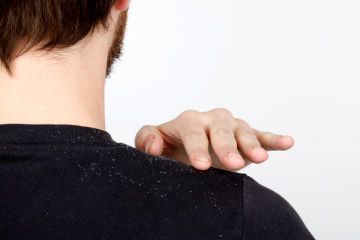Your body has an amazing ability to rejuvenate itself. The suit of skin you're wearing now won't be the same one you're wearing a month from now. But the problem is, the skin that is flaking off your head has become itchy and unsightly -- you have dandruff.
Dandruff is caused by a microscopic, yeast-like fungus called malassezia. Malassezia is also found on healthy human heads but, for some unknown reason, it gets out of control on the scalps of an unlucky group of people. The cell turnover that would take 27 or 28 days on a healthy head, takes two weeks or less on the skin of someone with dandruff. Those dead cells tend to clump together and then -- because of natural oils -- stick on your head and clothing, refusing to harmlessly drift away. That's the science of the matter; below are some solutions.
Advertisement
- Avoid the sticky stuff: Yes, you like to be cool and coiffed with hair gels, mousse and spray, but if you can use a bit less of these salon products, your scalp will thank you. If you can't bear to use less, then use them less often. If there's a day or two a week that you don't have to be runway ready, that's the time. Hair-styling chemicals have a tendency to dry the scalp, which makes dandruff worse -- and that, certainly, is not the look you're after.
- Resist the scratch: It's natural -- you itch, you scratch. But as relieving as it may feel, scratching is essentially digging your fingernails into sensitive skin. Once you have tiny wounds on your head, you'll have to temporarily stop using the medicated treatment that you'll find later on the list.
- Shower quickly after sweating: Sweat is, largely, a good thing. It keeps you cool and it's usually an indication you're working hard to keep your body healthy. But it's also irritating to your scalp. In addition, sweat makes skin cells flake off your body more quickly. When you exercise, don't delay cleaning up. Hop in a shower at your earliest convenience.
- Change shampoos: When malassezia goes crazy, it's time to set aside your usual shampoo and buy an over-the-counter anti-dandruff shampoo. Scan the ingredients. You'll want one that has zinc pyrithione to control fungus, salicylic acid (which works as a scrub to remove dead cells), selenium sulfide to reduce the speed of cell replacement, and ketaconazole, which also eliminates a variety of fungi.
- Bring in the tar: If you've tried all these preventative measures and you've also used anti-dandruff shampoos without success, it's time to bring in the powerful stuff -- tar shampoos. This centuries-old remedy is effective at reducing cell turnover. However, there's a reason it's your last and most extreme option. It has a strong smell and it can discolor the shaft of light-colored hair. Lemon juice and cream rinse can be helpful in reducing the side effects of this tough dandruff solution.
Dandruff is an itchy, unsightly and stubborn problem -- but hang in there. You can get back to a scratch-free and pleasant existence.
Advertisement


